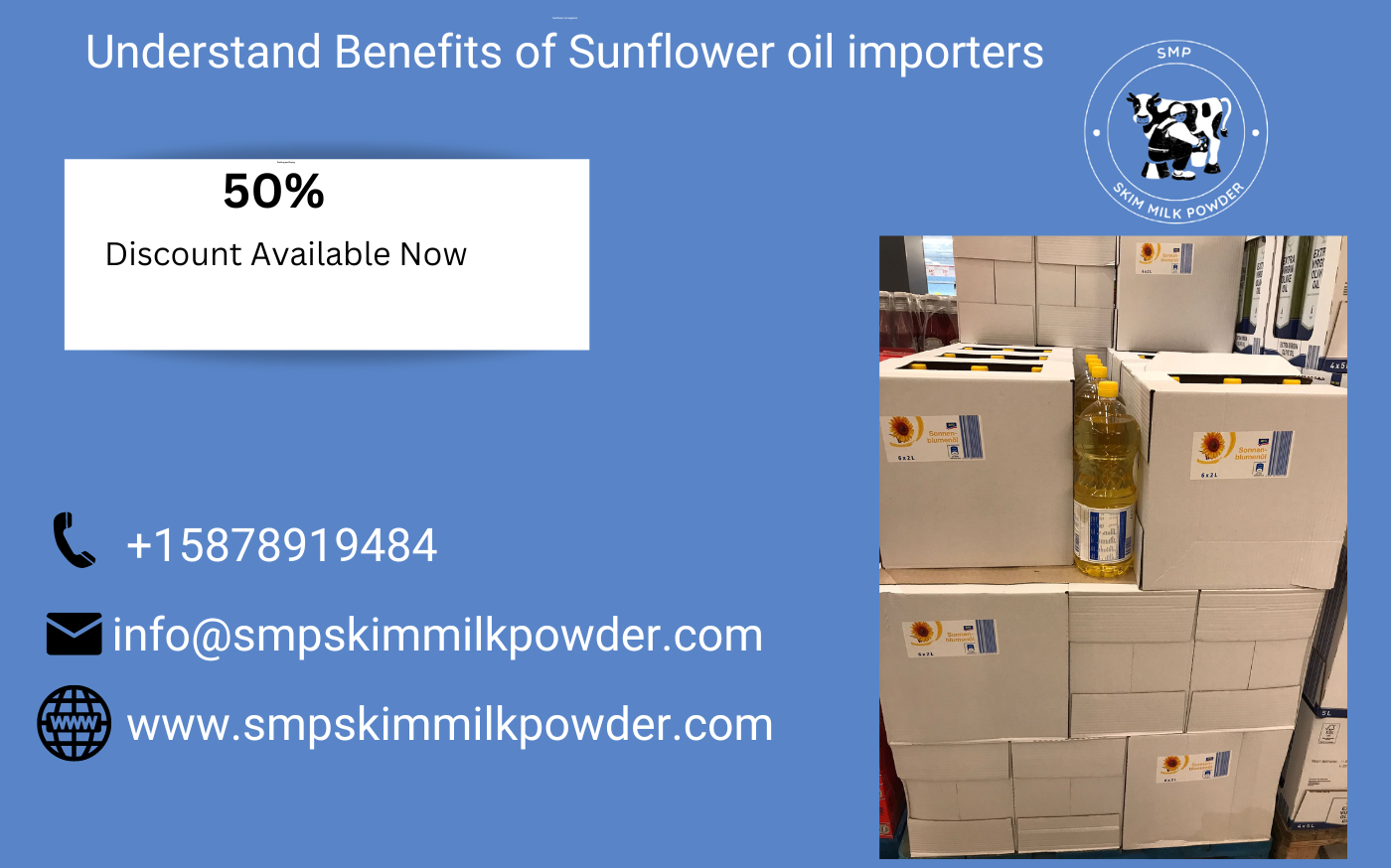Sunflower oil importers play a critical role in bridging the gap between sunflower oil producers and consumers in international markets. These importers ensure a steady supply of sunflower oil to meet the diverse needs of households, restaurants, food manufacturers, and other industries that rely on this versatile oil.
Key Roles and Functions of Sunflower Oil Importers
- Market Research and Analysis:
- Demand Assessment: Importers analyze market trends and consumer preferences to gauge demand for sunflower oil.
- Supplier Evaluation: They assess and select reliable suppliers based on quality, pricing, and production capacity.
- Sourcing and Procurement:
- Supplier Relationships: Importers establish and maintain strong relationships with exporters from major producing countries such as Ukraine, Russia, and Argentina.
- Contract Negotiations: They negotiate contracts to secure favorable terms, including price, delivery schedules, and payment conditions.
- Quality Assurance:
- Standards Compliance: Importers ensure that the sunflower oil meets local regulatory standards and quality specifications.
- Third-Party Testing: They may employ third-party laboratories to test the oil for purity, nutrient content, and absence of contaminants.
- Logistics and Distribution:
- Shipping Coordination: Importers handle the logistics of transporting sunflower oil from the exporting country to their domestic market, ensuring efficient and timely delivery.
- Customs Clearance: They manage the necessary documentation and procedures for customs clearance, complying with import regulations.
- Marketing and Sales:
- Market Penetration: Importers develop strategies to introduce and promote sunflower oil in their markets, targeting both retail and commercial sectors.
- Branding: They may rebrand imported sunflower oil under their own labels to cater to local consumer preferences.
Major Sunflower Oil Importing Countries
- India:
- Largest Importer: India is the world’s largest importer of sunflower oil, driven by high domestic demand and limited local production.
- Consumer Preferences: Sunflower oil is favored for its light taste and health benefits, making it a staple in Indian households and food industries.
- China:
- Growing Demand: As dietary habits evolve, the demand for healthier cooking oils like sunflower oil is increasing in China.
- Urbanization and Income Growth: Rising urbanization and income levels contribute to higher consumption of imported edible oils.
- European Union:
- Diverse Demand: Countries within the EU import sunflower oil for various uses, from household cooking to food manufacturing.
- Regulatory Standards: The EU has stringent quality and safety standards that importers must adhere to.
- Middle East and North Africa (MENA):
- Culinary Use: Sunflower oil is widely used in the MENA region for cooking and frying, leading to significant import volumes.
- Population Growth: Increasing population and urbanization drive the demand for imported edible oils.
Market Trends and Opportunities
- Health and Wellness:
- Health-Conscious Consumers: Growing awareness of the health benefits of sunflower oil, such as its high vitamin E content and balanced fatty acid profile, boosts demand.
- Organic and Non-GMO Varieties: There is a rising interest in organic and non-GMO sunflower oil, particularly in developed markets.
- Culinary Versatility:
- Restaurant and Food Service Sector: Sunflower oil’s high smoke point and neutral flavor make it a preferred choice in professional kitchens.
- Processed Foods: It is used as an ingredient in a wide range of processed foods, from snacks to baked goods.
- Sustainable Sourcing:
- Ethical Consumerism: Importers are increasingly focusing on sustainability and ethical sourcing practices to meet consumer demand for environmentally friendly products.
- Traceability: Advanced traceability systems are being adopted to ensure the origin and quality of the sunflower oil.
Challenges Faced by Sunflower Oil Importers
- Price Volatility:
- Market Fluctuations: Global prices of sunflower oil can be volatile due to factors such as weather conditions, geopolitical events, and changes in supply and demand dynamics.
- Currency Exchange Rates: Fluctuations in currency exchange rates can impact the cost of imports.
- Regulatory Compliance:
- Import Regulations: Importers must navigate complex regulatory landscapes, ensuring compliance with local food safety and quality standards.
- Tariffs and Trade Barriers: Tariffs and trade restrictions imposed by importing countries can affect the profitability and feasibility of imports.
- Supply Chain Disruptions:
- Logistics Challenges: Issues such as port congestion, transportation delays, and disruptions in shipping routes can impact the timely delivery of sunflower oil.
- Pandemic Impact: The COVID-19 pandemic has highlighted vulnerabilities in global supply chains, leading to disruptions in production and distribution.
Conclusion
Sunflower oil importers are vital to the global food industry, ensuring the availability of high-quality sunflower oil in various markets. They navigate complex supply chains, regulatory environments, and market dynamics to meet the growing demand for this versatile and healthful oil. Despite facing challenges such as price volatility and regulatory compliance, the outlook for sunflower oil importers remains positive, driven by trends in health and wellness, culinary applications, and sustainable sourcing practices.

